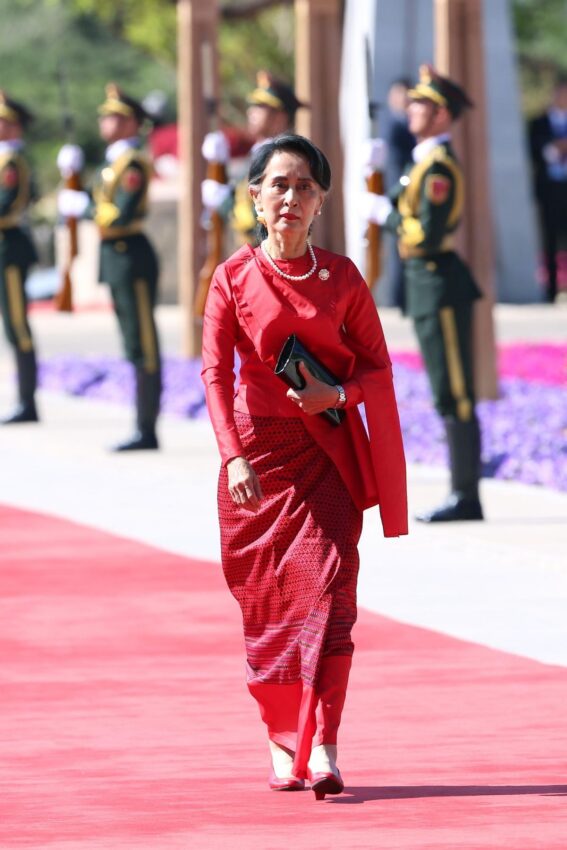Discover the powerful and controversial life of Aung San Suu Kyi—from Nobel Peace Prize winner to a leader under fire. A journey of strength, silence, and difficult choices.

Aung San Suu Kyi – The Woman Who Rose and Fell
Introduction
Aung San Suu Kyi was once seen as the beacon of democracy. Her story moved millions.
She spent years in house arrest, separated from her family, just to bring freedom to Myanmar.
But over time, that image faded. Her silence during the Rohingya crisis shocked the world.
Today, her name sparks debate, admiration, and disappointment—all at once.
Let’s walk through her powerful yet complicated journey.
A Childhood Marked by Legacy
Suu Kyi was born in Yangon (Rangoon) in 1945. Her father, General Aung San, was a national hero.
He negotiated Myanmar’s independence from British rule but was assassinated when Suu Kyi was just two.
Her mother became a diplomat. Suu Kyi grew up surrounded by politics, sacrifice, and patriotism.
Her upbringing shaped her deep love for freedom and justice.
A Quiet Life Abroad
In the 1960s, Suu Kyi studied in India and the UK.
She attended Oxford University, where she studied politics, philosophy, and economics.
There, she met her future husband, Michael Aris, a British academic.
They married and had two sons. Life in England was peaceful and ordinary.
But everything changed in 1988, when she flew back to Myanmar to care for her sick mother.
A Nation in Crisis
Myanmar was in turmoil. People had taken to the streets, demanding an end to military rule.
Suu Kyi couldn’t stay silent. She stood up, gave speeches, and quickly became a symbol of non-violent resistance.
Her speeches echoed with hope. Her courage reminded many of Albert Schweitzer, a man who left everything to help others. Read more about him.
In 1989, she was arrested and placed under house arrest.
Life in Isolation
For 15 out of 21 years, Suu Kyi was under house arrest.
She couldn’t see her family. She couldn’t speak to the public.
Her husband died of cancer in 1999. The military never allowed her to see him one last time.
Despite all this, she refused to leave Myanmar. Her resolve touched the world.
In 1991, she was awarded the Nobel Peace Prize for her unwavering commitment to peace.
She became a global icon, much like Dr. Denis Mukwege, who also sacrificed comfort to fight injustice. Learn about his fight.
Return to Politics
After her release in 2010, hope surged again in Myanmar.
In the 2015 elections, Suu Kyi’s party—the National League for Democracy (NLD)—won a landslide victory.
Although the military blocked her from becoming President, she was made State Counsellor, a new position created just for her.
People celebrated. The world applauded. A new democratic chapter had begun.
It was similar to the joy people felt when Nelson Mandela walked free.
The Rohingya Crisis – A Turning Point
But in 2017, a major tragedy unfolded.
The military launched a crackdown on the Rohingya Muslims, a minority group.
Villages were burned. Thousands were killed. Over 700,000 fled to Bangladesh.
The world turned to Suu Kyi, expecting her to act. But she stayed mostly silent.
She even defended the military in international courts.
Many were shocked. Nobel laureates condemned her. Awards were taken away.
Her image as a human rights defender collapsed.
Much like Jane Goodall, who dedicated her life to giving a voice to animals and nature, read more, people expected Suu Kyi to speak up for the voiceless Rohingya—but she didn’t.
The 2021 Coup
In February 2021, the military struck again.
They overthrew the civilian government and arrested Suu Kyi.
Protests erupted nationwide. The military cracked down hard.
Hundreds died. Thousands were imprisoned.
Suu Kyi now faces multiple charges, including corruption and election fraud.
Some say the charges are false, meant to silence her forever.
A Legacy in Question
Aung San Suu Kyi’s story is not black and white.
She gave up everything for democracy. She endured pain, isolation, and loss.
But she also failed to speak up when it mattered most.
Her story teaches us how complex leadership can be.
She was once called “The Lady”, a symbol of hope. Now, her name raises difficult questions.
Can one be a hero and flawed at the same time?
Even great leaders, like those on America112.com, are human and make mistakes.
Conclusion
Aung San Suu Kyi’s life is one of courage, pain, silence, and controversy.
She inspired millions but also disappointed many.
Her journey reminds us that leadership comes with heavy responsibility.
And in the end, history remembers not just what we fight for—but who we defend and who we forget.
If stories like this interest you, read about Denmark’s respect for women, or take a deep dive into China’s powerful past.
Also, don’t miss this ultimate tourism guide to the UAE.

